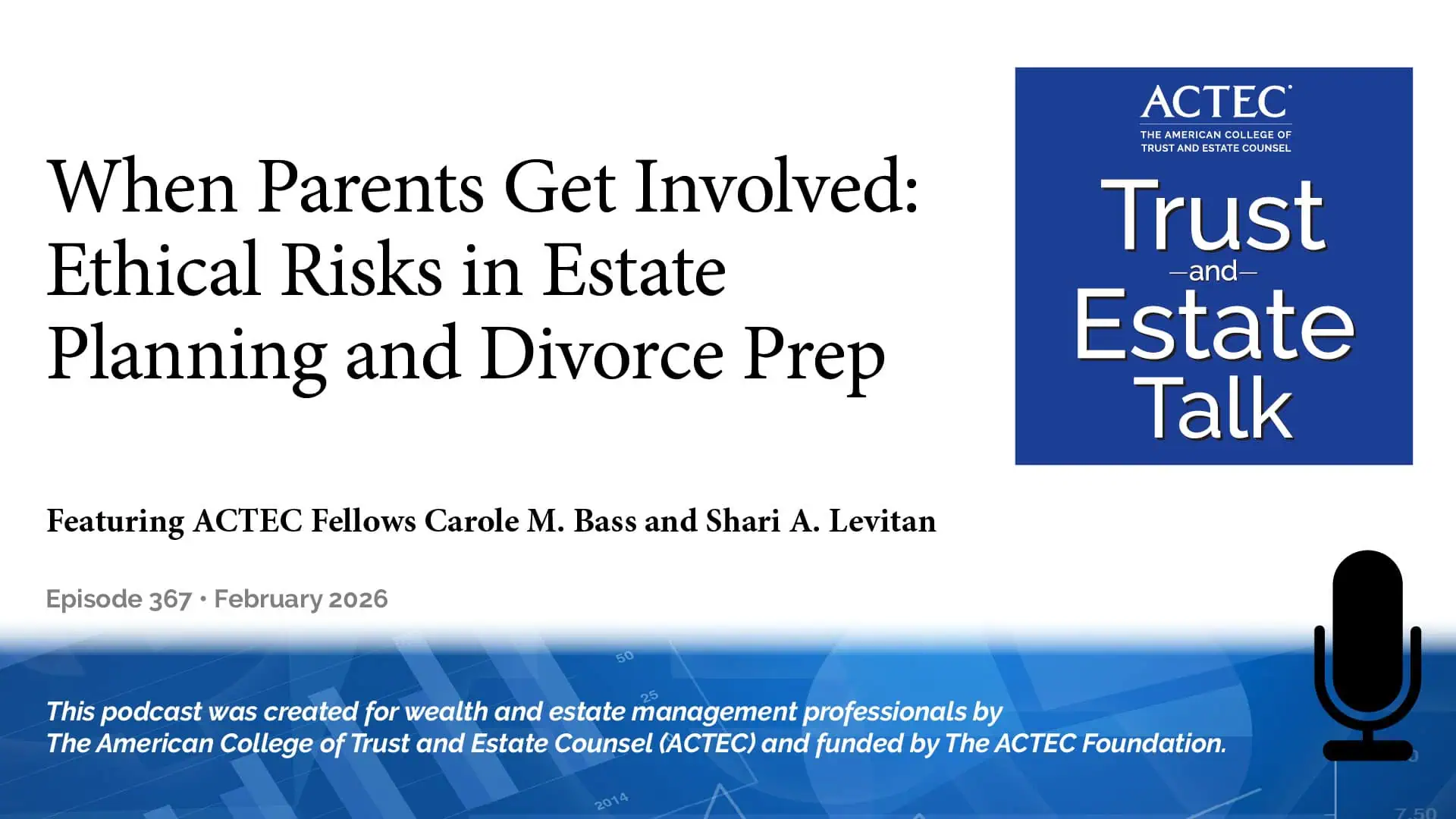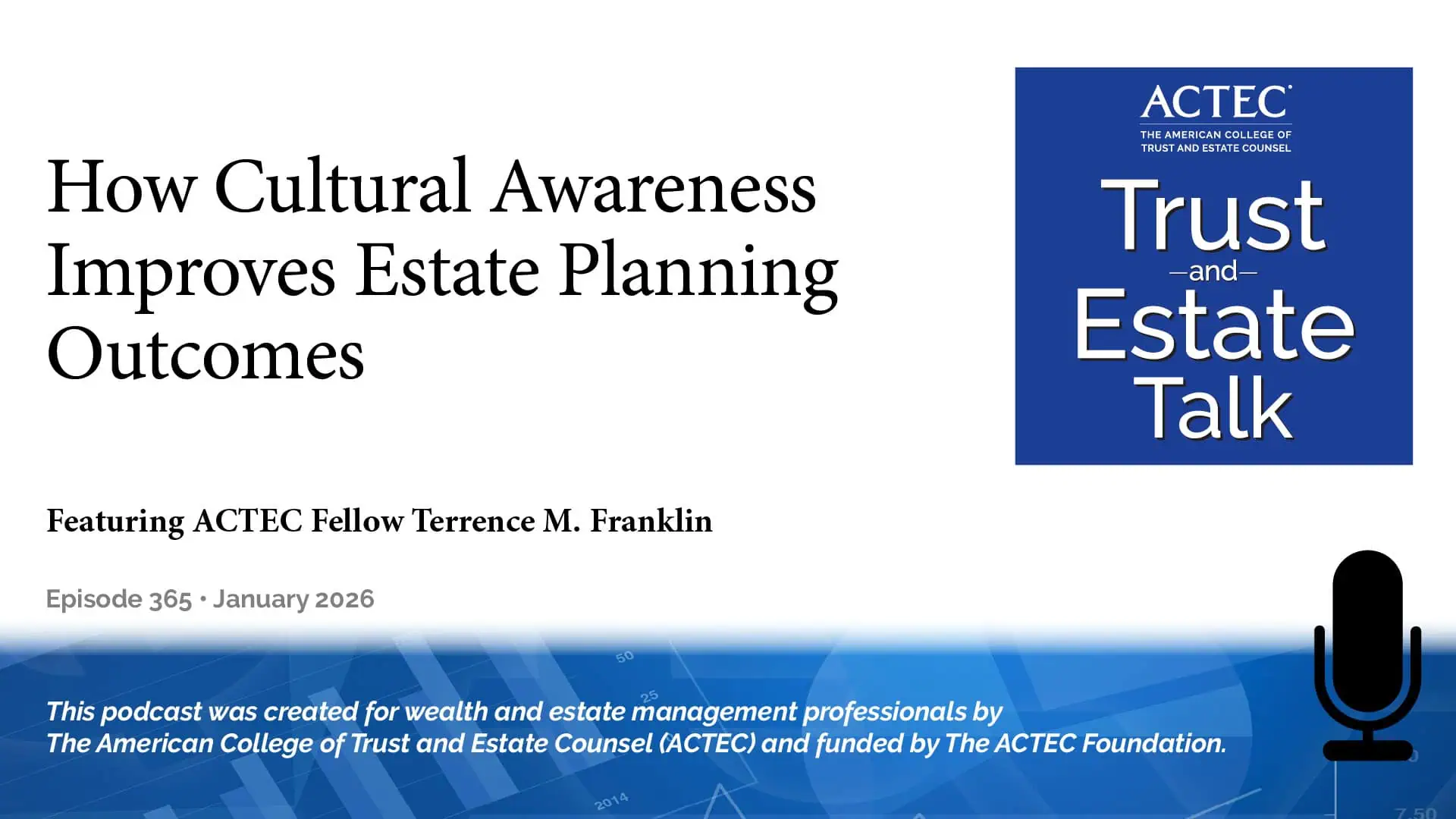Lessons From Lisa Marie Presley’s Estate: Why Use a Corporate Trustee
“Lessons Learned from the Estate of Lisa Marie Presley,” that’s the subject of today’s ACTEC Trust and Estate Talk.
Transcript/Show Notes
This is Natalie Perry, ACTEC Fellow from Chicago. The press coverage regarding the estate of Lisa Marie, the daughter of Elvis Presley, and the complications of failing to appoint a corporate trustee to manage it have caused discussions among trust and estate professionals about the advantages of a corporate trustee. What are the advantages of selecting a corporate trustee for the right situation? ACTEC Fellow Sharon Klein from New York City will share her thoughts and recommendations on this topic. Thank you, Sharon.
Thanks very much, Natalie. It’s a pleasure to be here. And, as you’ve just alluded to, the Elvis Presley family dispute has been all over the news. The question is: what can we learn from it?
Elvis Presley Estate Overview
First, let’s identify the cast in this ugly drama. We have the decedent- as you mentioned, Natalie- Lisa Marie Presley, who was Elvis’s only child and sole heir to her father’s estate. We have Elvis’s wife, Priscilla, the mother of Lisa Marie. And we have one of Lisa Marie’s daughters named Riley. So, now we have the cast.
Let’s ask, when Lisa Marie tragically died in January 2023 of cardiac arrest at the age of 54, did her family come together over this sudden loss? Using the titles of some of Elvis’s most famous songs, was it Love me Tender? Unfortunately, not for Elvis’s family. Suspicious Minds, perhaps? That’s more like it. Following the death of Lisa Marie, her mother, Priscilla, is All Shook Up. Stories about Priscilla’s challenges to her daughter’s trust have been splashed all over the headlines. She is challenging an amendment made to Lisa Marie’s revocable trust that removed Priscilla and a former business manager from acting as trustees and instead named Lisa Marie’s daughter, Riley.
It’s been reported that Priscilla and Riley have stopped speaking since Lisa Marie’s death and that Riley is heartbroken that this has turned into a public matter and knows her mother would never have wanted this. Indeed, there are very public court filings that have placed intimate details of the battle between granddaughter and grandmother front and center. Now, amidst Priscilla’s claims of fraud, as she does battle with her granddaughter over controlling assets that include the King’s Graceland estate, we might ask, could this all have been avoided? Without getting into the weeds of this very ugly dispute, perhaps the most important lesson to be learned is that great care should be exercised in appointing a trustee.
Appointing an independent, neutral corporate trustee with deep expertise in administering trusts and maneuvering through family dynamics can often eliminate suspicious minds and facilitate family harmony. So, what are the benefits of appointing a corporate trustee? Of course, not all corporate trustees are created equal and the benefits I’m about to describe might not apply equally across the board. It’s very important for people to do their due diligence to find a corporate trustee that fits their needs and has the depth of experience and resources they are looking for.
Top 10 Benefits of Partnering with a Corporate Trustee for an Estate
That said, here are my pick of the top 10 benefits of partnering with an experienced and established corporate trustee.
#1 – Corporate Trustees are Highly Trained
Benefit number one: corporate trustees are highly trained. They have professional knowledge and expertise in the legal and administrative intricacies of trust management. Corporate trustees have the infrastructure and experience to deal with complexity, and that includes unique asset administration like business interests, real estate, loans. Corporate trustees can also discharge a panoply of trust-related services like trust tax return preparation, record keeping, trust accountings, and consolidated reporting. Corporate trustees have the experience to help maximize tax savings and ensure tax and legal compliance. Individuals just do not typically have the bandwidth or training of a corporate trustee.
#2 – Corporate Trustees are Focused and Have Resources
Benefit number two: a corporate trustee’s full-time focus is on acting as a trustee with the experience and resources to professionally discharge that role. Individuals typically have other jobs. They have active lives, and they just can’t devote their full-time attention to acting as trustee. Individuals also take vacations, they get sick.
Distribution decisions and other decisions that a trustee makes often need to take into account the circumstances of the beneficiaries, which also means that trustees need to keep in regular contact with the beneficiaries to stay abreast of their situations. These are all very time-consuming responsibilities. And a corporate trustee has the wherewithal, the infrastructure, and the staffing to commit to the trustee role full-time.
#3 – Corporate Trustees are Regulated and Monitored
Benefit number three: a corporate trustee is regulated and monitored by government agencies and state and federal laws. Corporate trustees are also subject to both internal and external audits, so they are held to higher standards than an individual trustee who is not subject to those regulations and audit procedures. And, I should add, that if an individual makes a wrong decision, unhappy beneficiaries are apt to sue and can hold an individual trustee personally accountable. If so, an individual may not have the same financial resources to cover the resulting loss that a corporate trustee would have. Corporate trustees also typically carry errors and omissions insurance (E&O), but individual trustees rarely do since it may be very difficult for them to obtain that type of insurance and very expensive even if it is possible to obtain it.
#4 – May be Able to Take Advantage of Another State’s Laws
Benefit number four: using a corporate trustee you can potentially take advantage of another state’s favorable laws. For example, if you use a Delaware corporate trustee, you may be able to create a trust that takes advantage of Delaware law even though neither the trust creator nor any of the beneficiaries actually live in Delaware. Delaware’s advantages can include enhanced asset protection, income tax savings, the ability to create perpetual trusts, and the ability for someone to control a trust investment or distribution decisions through the so-called directed trust mechanism.
#5 – Cost Savings Benefits When Using a Corporate Trustee
Benefit number five: you may save costs using a corporate trustee. I know this one is counterintuitive because many people automatically think that a corporate trustee will be very expensive. But consider if you appoint Uncle Joe as your trustee. Uncle Joe is likely going to have to outsource many services, and that includes hiring an investment manager to manage the trust assets probably. So, you will potentially be paying Uncle Joe as a trustee and then paying an investment manager for investment services.
And Uncle Joe may have to go out and hire an accountant to do the trust tax returns, the trust accountings, and he may potentially have to hire other professionals to handle record keeping and other legal and administrative responsibilities. If you appoint a corporate trustee that is also responsible for investing the trust assets and performing fiduciary responsibilities, you could actually save costs because you can get one bundled comprehensive fee.
#6 – Corporate Trustees Have an Unlimited Lifespan
Benefit No. 6: corporate trustees don’t die, so they have unlimited lifespans, while individual trustees will need to name successors in the event of death, incapacity, or incompetence. And there are also potential breaks in service when you appoint successor trustees since there may be a need for an accounting or other court proceeding before a new trustee can take over.
And, particularly in the context of trusts designed to last for many years and especially dynasty trusts, which are designed to last for generations, naming a corporate trustee can provide stability and continuity. And, I should add, that doesn’t mean that you’re stuck with a particular corporate fiduciary. It’s commonplace and actually recommended to include in trust documents the power for beneficiaries or other individuals to remove the corporate trustee and appoint another one if that’s appropriate. It’s also possible, of course, to appoint a family member to act alongside a corporate trustee if that is desired.
#7 – Corporate Trustees Have Internal Controls and Procedures
Benefit number seven: a corporate trustee’s internal controls and procedures are designed to be reliable and consistent. That provides continuity and stability in the trust administration and decision-making process with the ability to make tough decisions like a decision whether or not to make a distribution within a consistent and dependable framework.
#8 – Corporate Trustees Help Maintain Family Unity and Reduce Stress
And that actually segues very nicely to benefit number eight: which is that corporate trustees can make tough decisions and help maintain family unity by taking sole responsibility, for example, over a decision whether or not to make a distribution, which can be contentious. Where the interests of the beneficiaries can often be at odds, the decisions family member trustees need to make can become very difficult, very stressful, and tensions can erupt.
#9 – Corporate Trustees Have Integrity
Benefit number nine: integrity. A trustee must administer a trust in the best interest of the beneficiaries. A trustee has a duty of loyalty to the beneficiaries and cannot act in their own self-interest. But unlike family members who may easily be swayed by family disharmony, a corporate trustee can make decisions professionally and dispassionately.
#10 – Corporate Trustees Have Objectivity
Benefit number ten: corporate trustees are impartial and objective. They’re impartial in exercising their responsibilities, including, as I mentioned, making distribution decisions or determining how best to leverage or invest trust assets by weighing the interest of all the beneficiaries in an independent and unbiased manner by interpreting and applying the frequently complex language of the trust document against the backdrop of individual beneficiary circumstances and other relevant facts. In other words, corporate trustees can be the objective voice that can often minimize conflict and help prevent family members, who otherwise might have been named trustees, from taking sides and dividing a family.
Does that sound familiar for our Elvis situation? Mm-hmm. Corporate trustees can really take the emotion out of decision-making and leverage sound decision-making infrastructure and procedures. Ultimately, the choice of trustee is a personal decision, but I think it’s important to consider that you may not be doing a friend or family member a favor by appointing them in the role of trustee. Many individual trustees will be overwhelmed with all the responsibilities entailed in the role. They won’t have a full understanding of all the obligations and potential liabilities to which they are subject. They won’t be properly equipped to handle the wide variety of fiduciary tasks, not to mention the fact that you may be putting them in a very difficult situation vis á vis the family when tough decisions have to be made and that could jeopardize family harmony. As I mentioned, sometimes an individual and a corporate trustee can work together with the individual trustee providing perspective on family dynamics and the corporate trustee providing the resources, infrastructure, and experience.
The bottom line is that people need to weigh the complexity of the situation, family dynamics, and the ability of an individual trustee to devote the time necessary to the very time-intensive administrative record-keeping and investment tasks while maneuvering potential minefields of family tension. And, as you weigh these considerations, the Presley battle is perhaps a real-life commercial for a corporate trustee and is certainly a learning moment.
Thank you, Sharon, for helping us understand the advantages of using a corporate trustee.
You may also be interested in:
This podcast was produced by The American College of Trust and Estate Counsel, ACTEC. Listeners, including professionals, should under no circumstances rely upon this information as a substitute for their own research or for obtaining specific legal or tax advice from their own counsel. The material in this podcast is for information purposes only and is not intended to and should not be treated as legal advice or tax advice. The views expressed are those of speakers as of the date noted and not necessarily those of ACTEC or any speaker’s employer or firm. The information, opinions, and recommendations presented in this Podcast are for general information only and any reliance on the information provided in this Podcast is done at your own risk. The entire contents and design of this Podcast, are the property of ACTEC, or used by ACTEC with permission, and are protected under U.S. and international copyright and trademark laws. Except as otherwise provided herein, users of this Podcast may save and use information contained in the Podcast only for personal or other non-commercial, educational purposes. No other use, including, without limitation, reproduction, retransmission or editing, of this Podcast may be made without the prior written permission of The American College of Trust and Estate Counsel.
If you have ideas for a future ACTEC Trust & Estate Talk topic, please contact us at ACTECpodcast@ACTEC.org.
© 2018 – 2026 The American College of Trust and Estate Counsel. All rights reserved.
Latest ACTEC Trust and Estate Talk Podcasts

Estate Planning Considerations in Community Property States Relating to Retirement Accounts
Explore how community property laws shape IRAs, 401(k)s, beneficiary designations, and spousal rights in retirement account estate planning.

When Parents Get Involved: Ethical Risks in Estate Planning and Divorce Prep
When parents join prenup or divorce planning, ethical risks follow. ACTEC Fellows explore privilege, conflicts, and protecting the attorney-client relationship.

Useful But Overlooked Trusts: A Planner’s Guide to When and How to Use Them
Explore overlooked trusts—including HEETs, alimony, voting, and blind trusts—and when estate planners should use them to address complex client needs.



